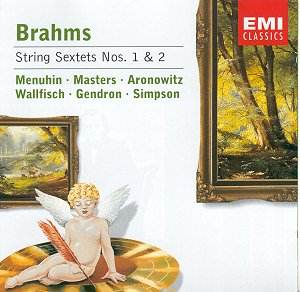The combination of the name of Brahms and string chamber
music tends to conjure up austere, cerebral images, yet the first Sextet
exploits the potential richness of the six players to create a glorious
lyrical outpouring. That it creates this impression is due in no small
measure to the performers. Apart from Menuhin himself, we have the then
leader of the Bath Festival Orchestra (of which Menuhin was director
at the time), Robert Masters, three leading British-based chamber musicians
and, in Maurice Gendron, a soloist of international stature. These line-ups
don’t always work, of course; these players are clearly united by their
love of the music they are playing. It would be hard to describe adequately
such wonderful music-making, and reductive to single out particular
passages when the whole is so convincing. It seems that their familiarity
with the work is such that they can be quite flexible over details without
ever losing sight of the overall shape. Above all, they seem to alight
upon each new moment as if they are discovering it for the first time.
This is a treasurable performance indeed.
Although the two Sextets were published three years
apart, it is likely that they were written more or less contemporaneously.
The second produces a remarkably spare texture considering six instruments
are involved and there is a suspicion about it of "well, I’ve written
one so I suppose I’d better write another". It is one of those
Brahms works where a logical structural layout seems to prevail over
communicative urgency, causing it to yield its secrets more slowly.
Or is it the performers who make it seem so? For I also detect a feeling
of "well, we’ve recorded no. 1 so we’d better record no. 2".
Another time, even if the same place … It’s a highly professional job,
from composer and performers alike, no doubt about it, and inspiration
can’t always be caught on the wing.
If another group can persuade me that the relative
inspiration of these two works is the other way round I shall be delighted
to say so. In the meantime, the quite wonderful playing of no. 1, in
a warm, clear and well-balanced recording, is more than enough to make
this an essential disc. The "music-for-the-kiddies" notes
offer brief introductions to composer, music and "The Artist"
– Yehudi Menuhin. And what if one of the kiddies pipes up with, "Hey,
daddy, there’s six of them"?
Christopher Howell


